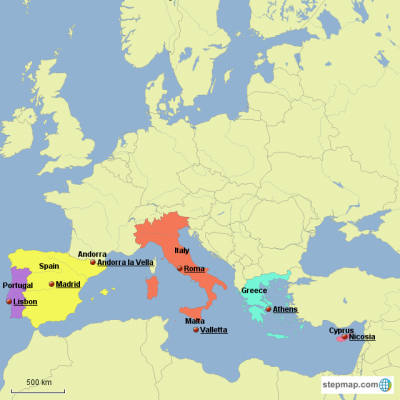Coronavirus Pandemic Has Shown that Mediterranean Europe Does Not Need THE EU

Germany’s long history of wanting to rule the entirety of Europe extends back to both World Wars in the 20th Century, and perhaps even earlier. The German political structures believed that through war and conquest it could dominate the continent – this of course lacked any realism. Even with Germany’s defeat in World War II, it still did not abandon this ambition, albeit, it was not possible for many decades because of U.S. dominance on the continent and the Soviet counterweight.
However, Germany played the long game and with the imminent collapse of the Soviet Union, Berlin signed the “4 + 2 Treaty” on October 3, 1990 to unify capitalist West Germany with communist East Germany. With unification achieved, then-German Chancellor Helmut Kohl made the next steps for Germany to dominate Europe, the signing of the 1992 Maastricht Treaty that brought to life the European Union and opened the path for the Euro Dollar.
Eight years later, then-German Foreign Minister Joska Fischer during a speech at the Humboldt University in Berlin said that German and European unification were two sides of the same coin, openly admitting that the European Union is inseparable to Germany. With more than a quarter of the Eurozone’s wealth in German hands, there is little doubt that Berlin’s quest to dominate Europe is finding more success through the Western liberal model of open borders and a “shared” market rather than through military might and conquest. It is now appearing though that Germany is beginning to lose control of the dominance it once had over the continent though. France, Italy and Britain served as balance to West Germany, but that balance was tilted towards Germany after unification, and especially now since Brexit.
Britain of course first comes to mind when we think of the dissolvement of the European Union. Although Britain is a wealthy and powerful country to lose, and there is no doubt it caused a major blow to the pan-European project, Britain maintained some semblance of sovereignty by maintaining the Pound and not adopting the neo-Mark, the Euro Dollar. Germany’s economic power also correlates with its political strength, which one of its main drivers is the Euro Dollar.
The countries touted as potentials to follow Britain are the three Mediterranean countries of Spain, Portugal and Greece. This is of no surprise as these are the three countries most affected by the Global Financial Crisis in 2009 and onwards. Although they are economically and politically weaker than Germany, ironically enough they are the only countries capable of serving as a potential counterweight to German dominance of the European Union.
Northern and central Europe in one way or another are directly tied to Germany, while the Mediterranean countries have a separation in geography, culture and history. Although French initiatives to contain German dominance in the European Union led to the European Central Bank and the Common Agricultural Policy, it has not only failed, but allowed Germany to control these institutions as well. France is limited in its capabilities as it is the only major power to border Germany and has a history of direct conflict when German nationalism became out of control and extremified.
Therefore, cooperation between Mediterranean Europe can pose the biggest challenge to German hegemony in Europe. Of course, there is the challenge that the interests of Spain, Portugal and Greece are not identical, but each have suffered immensely by German-imposed austerity and economic policy. The coronavirus pandemic has demonstrated that Germany is not willing to assist European Union member countries in times of crisis and that rather it serves its own interest first and foremost, just as it always has under the illusions of European unity.
Powerbrokers in Lisbon, Madrid and Athens must seriously consider methods on how best to achieve their own sovereignty to serve their own state interests instead of being under the domination of Berlin’s interests. The Mediterranean connects Europe, Asia and Africa together, meaning it occupies an extremely strategic space – far more strategic states than those who border Germany such as the Czech Republic or the Netherlands for example. By cooperating to achieve sovereignty, Mediterranean Europe will have far more leverage against Germany as it serves as a gateway to two other continents.
The coronavirus pandemic has shown that a divorce from Germany best serves the interest of Mediterranean Europe and has highlighted two facts; Spain was ignored and abandoned by Germany when the pandemic began, while Greece which was crippled by German and IMF-imposed austerity in the previous decade has shown that it can overcome challenges without European Union assistance with its impressive handling of the coronavirus.
Although Italy is a Mediterranean country, it is unlikely they will want to abandon the European Union project as it has the ambition to become “the Germany of the Mediterranean.” Portugal itself is also being devastated by the coronavirus but its present and future is always tied with that of Spain. Greece’s confidence in how it handled the pandemic and Spain’s disappointment with the German response for assistance should make these Mediterranean countries seriously consider their future in the European Union and whether a Mediterranean cooperation would better serve their interests.
*
Note to readers: please click the share buttons above or below. Forward this article to your email lists. Crosspost on your blog site, internet forums. etc.
This article was originally published on InfoBrics.
Paul Antonopoulos is a Research Fellow at the Center for Syncretic Studies.
Featured image is from InfoBrics

